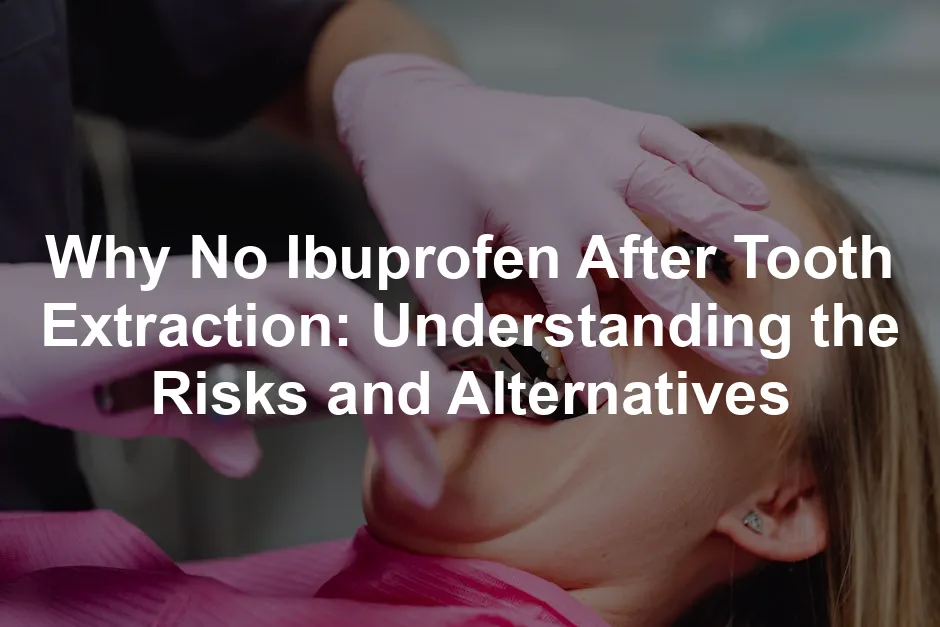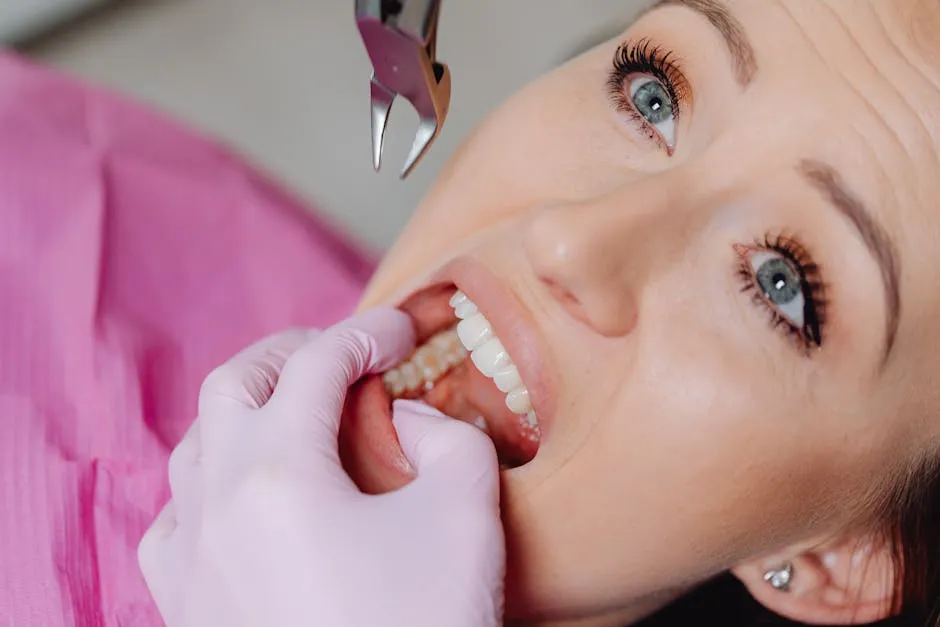
Why No Ibuprofen After Tooth Extraction: Understanding the Risks and Alternatives
Why No Ibuprofen After Tooth Extraction: Understanding the Risks and Alternatives
Introduction
Managing pain after tooth extraction is crucial. Many people reach for over-the-counter pain relievers, especially ibuprofen. However, dentists often recommend avoiding ibuprofen after extractions. This article explains the reasons behind this advice and presents safer alternatives for pain management.
In the realm of pain relief, Acetaminophen (Tylenol) is a superstar. It’s a pain reliever that doesn’t interfere with blood clotting, making it a safe alternative for post-extraction care. Remember, though, moderation is key! Stick to the recommended dosages to avoid any unwanted surprises.

Summary and Overview
Tooth extraction is a common dental procedure. Afterward, many patients experience pain and swelling. This pain is a natural part of the healing process, but it can be uncomfortable. Medications play a significant role in managing this discomfort. While ibuprofen is often used to alleviate pain and inflammation, it poses certain risks post-extraction. Concerns include increased bleeding and delayed healing, which can lead to complications. In this article, we will discuss these risks in detail, explore the reasons to avoid ibuprofen, and suggest safer alternatives for effective pain relief.
While you’re at it, consider stocking up on some Cold Packs for Pain Relief. They might just become your best friend during recovery! Applying a cold pack can help reduce swelling and numb the pain, making your healing process a tad more bearable.

The Risks of Taking Ibuprofen Post-Extraction
Increased Bleeding
Taking ibuprofen after a tooth extraction can significantly impact your healing process. Ibuprofen is a nonsteroidal anti-inflammatory drug (NSAID) that affects platelet function. When you take ibuprofen, it inhibits the platelets’ ability to aggregate, which is essential for blood clot formation. A stable blood clot at the extraction site protects the bone and promotes healing. If this clot is disrupted, it can lead to excessive bleeding.
Statistics show that approximately 3-5% of patients experience post-extraction bleeding. This number may increase with the use of ibuprofen. Excessive bleeding not only prolongs recovery but also heightens the risk of complications such as dry socket, a painful condition that occurs when the blood clot fails to form properly.
In summary, avoiding ibuprofen after a tooth extraction is vital for maintaining your body’s natural healing processes and minimizing the risk of complications.

To further aid your recovery, consider using an Instant Cold Compress. It’s perfect for those moments when you need quick relief without the fuss of ice packs. Just grab it and go!
Dry Socket
Dry socket, or alveolar osteitis, is a painful condition after tooth extraction. It occurs when the blood clot at the extraction site dislodges or dissolves too soon. Ibuprofen can contribute to this by affecting platelet function, making clotting less effective. Symptoms of dry socket include severe pain radiating to the ear, visible bone at the extraction site, and bad breath. Without treatment, it can prolong recovery and lead to infection. Studies show that the risk of developing dry socket increases with the use of certain pain medications, including ibuprofen. Research indicates that patients using NSAIDs post-extraction have a higher incidence of this condition. Avoiding ibuprofen may help minimize the risk of dry socket and promote smoother healing.
Impaired Healing Process
Ibuprofen is known for its anti-inflammatory properties, but it can mask signs of infection. This can complicate the healing process after tooth extraction. When you can’t recognize infection symptoms, you might delay necessary treatment. Monitoring your recovery is crucial for spotting complications early. Signs like increased swelling, fever, or persistent pain should not be ignored. If these symptoms are masked by ibuprofen, you might miss vital indicators of a problem. Therefore, being cautious with pain management is essential for effective healing after your tooth extraction.

Speaking of monitoring your recovery, have you tried Healing Herbal Tea? It’s a soothing way to stay hydrated and can help with recovery. Plus, who doesn’t love a warm cup of tea during healing? Just don’t spill it on your recovering mouth!
Alternatives to Ibuprofen for Pain Management
Acetaminophen (Tylenol)
Acetaminophen is a great alternative for managing pain after tooth extraction. Unlike ibuprofen, acetaminophen does not interfere with blood clotting. This makes it safer for post-operative care. For effective pain relief, the recommended dosage is 500-1000 mg every 4 to 6 hours. However, do not exceed 3000 mg in a 24-hour period unless advised by your doctor. Acetaminophen can help control pain without the risks associated with NSAIDs. Always consult your dentist for personalized advice on pain management following your procedure.

If you’re looking for a way to make taking medications easier, a Pill Organizer might be just what you need. It ensures you never miss a dose and helps you keep track of your medication schedule—because nobody wants to play the “Did I take it or not?” game!
Prescription Pain Medications
After a tooth extraction, dentists may prescribe stronger pain medications. This usually happens if the extraction is complex or if the patient experiences severe pain. Prescription pain relief often includes opioids or other stronger analgesics.
The advantage of these medications is their effectiveness in managing intense pain. They work quickly and can provide significant relief. However, they also come with drawbacks, such as the potential for addiction and unwanted side effects like nausea or drowsiness.
In contrast, over-the-counter options like acetaminophen are generally safer but might not be strong enough for everyone. It’s essential to weigh the pros and cons with your dentist. They will help determine the best approach for your recovery.

Non-Pharmacological Approaches
Managing pain after a tooth extraction doesn’t always require medication. Many patients find relief using natural methods. Cold compresses are highly effective. Applying a cold pack to the face can reduce swelling and numb the pain at the extraction site.
Rest is equally important. Your body needs time to heal, and lying down can help. Staying hydrated helps, too. Drinking plenty of fluids supports recovery. For those who enjoy keeping things fresh, a Hydration Bottle can be a stylish and convenient way to ensure you’re getting enough fluids!

A soft food diet is crucial during this period. Foods like yogurt, smoothies, and mashed potatoes are easy to eat and won’t irritate the extraction site. You may also want to check out a Soft Food Cookbook for some delicious ideas that won’t make you wince with pain!
When to Resume Ibuprofen
Timing and Considerations
After avoiding ibuprofen post-extraction, when can you resume it? Generally, it’s safe to consider taking ibuprofen 48 to 72 hours after the procedure. By this time, the initial healing should be underway, and the risk of complications decreases.
However, individual factors play a role. Always consult your dentist for personalized advice based on your specific situation. They can assess your healing progress and determine the right time to reintroduce ibuprofen.
Pain management is essential for a smooth recovery, so make sure to follow your dentist’s guidance closely. This ensures you recover comfortably and effectively.

And while you’re at it, consider an Comfortable Neck Pillow for those post-surgery naps. You’ll thank yourself later!
Conclusion
In summary, avoiding ibuprofen after tooth extraction is crucial for a smooth recovery. The risks associated with its use, such as increased bleeding and the potential for dry socket, can complicate your healing process. Following your dentist’s advice ensures optimal recovery and minimizes complications. Always prioritize your dental professional’s recommendations when it comes to pain management. If you’re unsure about your options, don’t hesitate to consult your dentist for personalized strategies tailored to your needs.

On your journey to recovery, don’t forget to pamper yourself a bit. A Cozy Blanket can make all the difference when you’re lounging on the couch with your favorite recovery snacks!
For more information on recovery post tooth extraction, including dietary recommendations, check out this essential guide for recovery.
FAQs
Can I take ibuprofen before my tooth extraction?
Taking ibuprofen before a tooth extraction can help manage pain and inflammation. However, it may increase the risk of bleeding during the procedure. Always consult your dentist before taking any medication preoperatively to ensure it’s safe for your specific situation.
What are the symptoms of dry socket?
Dry socket occurs when the blood clot at the extraction site is dislodged. Symptoms include severe pain radiating to the ear, bad breath, and visible bone at the site. If you notice these signs, contact your dentist promptly for evaluation and treatment.
How can I manage pain without medication?
You can manage pain naturally by using cold compresses on your face. Resting and staying hydrated are also helpful. Soft foods will be gentle on your recovery. Gentle saltwater rinses can aid healing without irritation.
Is it safe to use ibuprofen after the first few days?
Generally, it’s safe to consider resuming ibuprofen 48 to 72 hours post-extraction, depending on your healing process. Always consult your dentist for guidance tailored to your recovery to ensure you’re making the best choice for your health.
What should I do if my pain worsens?
If your pain becomes unmanageable after a tooth extraction, it’s important to take action. First, contact your dentist immediately. They can assess your situation and recommend the best course of action. Avoid taking ibuprofen during this time. Instead, consider using acetaminophen, which is safer for pain relief post-extraction. If the pain persists, your dentist may prescribe stronger medications or investigate potential complications. Monitor your symptoms closely. Signs like increased swelling, fever, or unusual discharge may indicate an infection or dry socket. Prompt communication with your dental professional can help you find relief and ensure proper healing.
Please let us know what you think about our content by leaving a comment down below!
Thank you for reading till here 🙂
All images from Pexels




